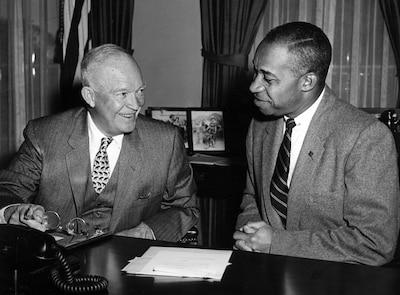
WASHINGTON —
The chairman of the Joint Chiefs of Staff accepted the Eisenhower Award May 10 from the National Defense Industrial Association on behalf of all service members and called on the organization to encourage members to cooperate with the Defense Department to ensure service members never fight in a fair fight.
Marine Corps Gen. Joe Dunford noted that NDIA, which was founded in the wake of America’s woeful industrial performance in World War I, is marking its 100th anniversary this year.
Becoming the ‘Arsenal of Democracy’
American service members fought in France using French and British weapons. American airmen flew French Nieuport and SPAD aircraft. American divisions went into battle firing French heavy artillery. Some American doughboys carried British or French personal weapons. Advances were supported by soldiers and Marines firing French machine guns.
The situation was vastly different just 20 years later, when the United States had truly become the arsenal of democracy. Cooperation between the military and the government led to the production of nearly 300,000 aircraft of all types between 1941-45.
In that same period, the United States produced almost 88,000 tanks and armored vehicles. The country built combat ships, cargo ships, oilers, patrol craft and landing craft at an unprecedented rate. At the end of the war, the U.S. Pacific Fleet alone was larger than any other nation’s navy.
Since then, public-private cooperation has had its ups and downs, Dunford said. But, he added, American service members have had the equipment and supplies they needed to secure America’s status as a great power able to deter nuclear war, fulfill alliance commitments and maintain a competitive advantage over any potential adversary.
Interesting Times
Dunford said this is the most complex time he has seen in his 40-plus years of service. As an example of this complexity he described a recent day in his calendar. On May 3, he said, he held discussions on the situation in Venezuela. Then he dealt with specific “threat streams” emanating from Iran. That was followed by reports from North Korea about missile shots into the East China Sea.
The whole time, Dunford said, negotiations over Syria and discussions about Afghanistan were weighing heavily, and even those issues were tinged by concerns over the great power competition with China and Russia.
“The challenge for all of us … is to try to deal with all of those operations … today, while keeping an eye on tomorrow, and making sure we continue to have a competitive advantage,” the chairman said.
Competitive Edge
But, Dunford said, America’s continued competitive advantage is not guaranteed. In fact, he said, it is being eroded. “When I talk about competitive advantage, I mean being able to project power when and where necessary to advance our national interests and being able to operate freely across all domains,” the chairman said.
Russia and China are building capabilities aimed at defeating America’s ability to project power, he said.
Maintaining America’s competitive advantage is a crucial element of its defense strategy, Dunford said.
This is where industry must step forward, he said. “Our ability to leverage industry here in the United States; our ability to maintain a technological edge over any potential adversary, if going to very much depend on the partnership between industry and the Department of Defense,” he said.
Patriotism vs. Profit
There are global industry partners “that don’t cooperate fully with the Department of Defense,” he said. “In their own minds they rationalize that their own ethos is not consistent with what we do.”
Dunford said he is addressing this directly because, “I have a hard time reconciling a company that is doing business in China, which indirectly — if not directly — supports the Chinese military.”
Any company of note in China has a base in the Chinese Communist Party, the chairman said. The Chinese will steal intellectual property from these companies, and that will benefit the Chinese military, he said.
“As we think about the future, we think about those individuals who benefit from our systems, who benefit from our values. I think there has to be some responsibility, some accountability in terms of who they do business with,” Dunford said.
These companies need to help the United States develop its technology to maintain the technological edge that will be crucial in the future, he said.
Companies need to understand what they are doing when they do business in countries that don’t hold democratic values, Dunford said.
“I understand … about quarterly earnings statements and bottom lines,” the chairman said. “But, just as I have to think about the close fight and the deep fight; what I am asking industry to do is think about the close fight and the deep fight. What may be convenient for you in the close fight, may be inconsistent with your interests in the deep fight as you start seeing a world that isn’t informed by U.S. leadership — that isn’t informed by U.S. values.”



